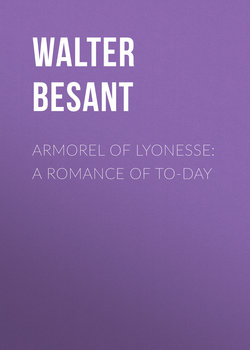Armorel of Lyonesse: A Romance of To-day

Реклама. ООО «ЛитРес», ИНН: 7719571260.
Оглавление
Walter Besant. Armorel of Lyonesse: A Romance of To-day
PART I
CHAPTER I. THE CHILD OF SAMSON
CHAPTER II. PRESENTED BY THE SEA
CHAPTER III. IN THE BAR PARLOUR
CHAPTER IV. THE GOLDEN TORQUE
CHAPTER V. THE ENCHANTED ISLAND
CHAPTER VI. THE FLOWER-FARM
CHAPTER VII. A VOYAGE OF DISCOVERY
CHAPTER VIII. THE VOYAGERS
CHAPTER IX. THE LAST DAY BUT ONE
CHAPTER X. MR. FLETCHER RETURNS FOR HIS BAG
CHAPTER XI. ROLAND'S LETTER
CHAPTER XII. THE CHANGE
CHAPTER XIII. ARMOREL'S INHERITANCE
PART II
CHAPTER I. SWEET COZ
CHAPTER II. THE SONATA
CHAPTER III. THE CLEVEREST MAN IN LONDON
CHAPTER IV. MASTER OF ALL THE ARTS
CHAPTER V. ONLY A SIMPLE SERVICE
CHAPTER VI. THE OTHER STUDIO
CHAPTER VII. A CANDID OPINION
CHAPTER VIII. ALL ABOUT MYSELF
CHAPTER IX. TO MAKE HIM HAPPY
CHAPTER X. THE SECRET OF THE TWO PICTURES
CHAPTER XI. A CRITIC ON TRUTH
CHAPTER XII. TO MAKE THAT PROMISE SURE
CHAPTER XIII. THE DRAMATIST
CHAPTER XIV. AN HONOURABLE PROPOSAL
CHAPTER XV. NOT TWO MEN, BUT ONE
CHAPTER XVI. THE PLAY AND THE COMEDY
CHAPTER XVII. THE NATIONAL GALLERY
CHAPTER XVIII. CONGRATULATIONS
CHAPTER XIX. WHAT NEXT?
CHAPTER XX. A RECOVERY AND A FLIGHT
CHAPTER XXI. ALL LOST BUT —
CHAPTER XXII. THE END OF WORLDLY TROUBLES
CHAPTER XXIII. THE HOUR OF TRIUMPH
CHAPTER XXIV. THE CUP AND THE LIP
CHAPTER XXV. TO FORGET IT ALL
CHAPTER XXVI. NOT THE HEIR, AFTER ALL
CHAPTER XXVII. THE DESERT ISLAND
CHAPTER XXVIII. AT HOME
CHAPTER XXIX. THE TRESPASS OFFERING
Отрывок из книги
It was the evening of a fine September day. Through the square window, built out so as to form another room almost as large as that which had been thus enlarged, the autumn sun, now fast declining to the west, poured in warm and strong; but not too warm or too strong for the girl on whose head it fell as she sat leaning back in the low chair, her face turned towards the window. The sun of Scilly is never too fierce or too burning in summer, nor in winter does it ever lose its force; in July, when the people of the adjacent islands of Great Britain and Ireland venture not forth into the glare of the sun, here the soft sea mists and the strong sea air temper the heat; and in December the sun still shines with a lingering warmth, as if he loved the place. This girl lived in the sunshine all the year round; rowed in it; lay in it; basked in it bare-headed, summer and winter; in the winter she would sit sheltered from the wind in some warm corner of the rocks; in summer she would lie on the hillside or stand upon the high headlands and the sea-beat crags, while the breezes, which in the Land of Lyonesse do never cease, played with her long tresses and kept her soft cheek cool.
The window was wide open on all three sides; the girl had been doing some kind of work, but it had dropped from her hands, and now lay unregarded on the floor; she was gazing upon the scene before her, but with the accustomed eyes which looked out upon it every day. A girl who has such a picture continually before her all day long never tires of it, though she may not be always consciously considering it and praising it. The stranger, for his part, cannot choose but cry aloud for admiration; but the native, who knows it as no stranger can, is silent. The house, half-way up the low hill, looked out upon the south – to be exact, its aspect was S. W. by S. – so that from this window the girl saw always, stretched out at her feet, the ocean, now glowing in the golden sunshine of September. Had she been tall enough, she might even have seen the coast of South America, the nearest land in the far distance. Looking S. W., that is, she would have seen the broad mouth of Oroonooque and the shores of El Dorado. This broad sea-scape was broken exactly in the middle by the Bishop's Rock and its stately lighthouse rising tall and straight out of the water; on the left hand the low hill of Annet shut out the sea; and on the right Great Minalto, rugged and black, the white foam always playing round its foot or flying over its great black northern headland, bounded and framed the picture. Almost in the middle of the water, not more than two miles distant, a sailing ship, all sails set, made swift way, bound outward one knows not whither. Lovely at all times is a ship in full sail, but doubly lovely when she is seen from afar, sailing on a smooth sea, under a cloudless sky, the sun of afternoon lighting up her white sails. No other ships were in sight; there was not even the long line of smoke which proclaims the steamer below the horizon; there was not even a Penzance fishing-boat tacking slowly homewards with brown sails and its two masts: in this direction there was no other sign of man.
.....
'We shall put up the sail and get back to Samson in twenty minutes. There is breeze enough for that.'
'Will you tell us,' said the artist, 'before you go – to whom we are indebted for our very lives?'
.....